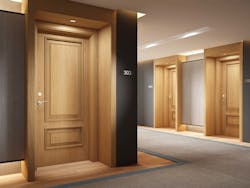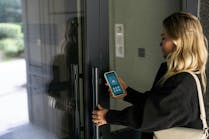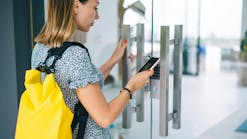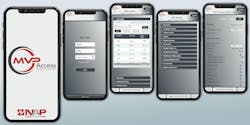Security at the Commerical Door: Hospitality
Running a hospitality-related business became much more difficult when COVID-19 entered the picture. As a result of the fear of death by the virus, concern over the spread and state-by-state lockdowns, travel all but came to a screeching halt. Plus, hotel staff now must clean more thoroughly and more often, and this raises the cost of doing business. Ask any hotel manager what this meant to their business, and they’ll tell you it resulted in financial hardship, with some going out of business.
According to the American Hotel and Lodging Association, the hotel industry experienced the most devastating year on record in 2020, resulting in historically low occupancy and massive job loss, in addition to hotel closures across the country. The hotel industry was one of the first industries affected by the pandemic, and it will be one of the last to recover. Travel isn’t expected to return to 2019 levels until 2024, the association says.
Meanwhile, crime remains a problem, even with the downturn, and not all of it is travel-related. Jeff Emmert, owner of Emmert Electronics of Huron, South Dakota, says common hotel security issues include employees who skim cash, allow friends to rent rooms for free and share copies of guest keys. Hotel guests are at risk of burglaries, vehicle break-ins and assault, partly because they’re in unfamiliar surroundings and traveling with items of value.
Hotels might face legal liability as a result of the crime. According to LegalMatch.com, “under the right circumstances, it is possible that the hotel could be at least partly responsible for crimes, especially if the hotel has not taken the proper measures to protect their guests.”
So, these days, hotels have multiple goals when it comes to providing security. They have to keep guests healthy while keeping them and their valuables secure, and they have to do the same for hotel staff and valuables. Locksmiths and security pros can help by providing two potential solutions: electronic access control (EAC) and video surveillance.
Access Control
For the most part, hotels have gotten away from a key in the door. But now the card access locks on hotel room doors and on the doors to common areas, such as the laundry, gym and executive offices, warrant attention. Many of these locks have “sheltered in place” far too long. In prepandemic times, these locks were sufficient, but now, because of the contact issue and emerging health regulations, they might have to be replaced with a no-touch alternative.
Hotels recognize this necessity, even high-priced big-city locations where the calling card is the hands-on service provided to guests, says Beth Kahwajy, the North American vertical business leader of hospitality for SALTO Systems.
“I’ve been talking to them about mobility and touchless for years, and they don’t want to do it, because they want to touch the customer,” she says. “They want to greet them at the front desk, walk them to their room, hang up their clothes. But what do [customers] want? Maybe they don’t want you to do that, especially now.”
As a result, more are eager to participate in pilot programs that include upgrades to smart locks. “They’re changing their ways,” Kahwajy says.
Another issue concerning older locks is that insertable cards can be duplicated easily because of outdated and easily hackable technology standards.
The solution: mobile credentials. By upgrading to smart locks and readers that accept mobile credentials, the credential goes from easily copyable cards to personalized credentials that can be issued from afar on a mobile device. These credentials typically use 128 AES encryption, which is said to require quantum computing to crack.
The use of smart locks and mobile credentials got a big push in short-term rentals, such as AirBNB, and continue to move into hotels. For example, the Hilton group of hotels uses this means of access, which it calls Digital Key. “Digital Key is part of our Contactless Experience as a part of CleanStay and our pledge to keep guests safe and reduce touchpoints during their stay,” according to Hilton.
Guests register with a facility through Hilton’s online portal. After the necessary monetary transaction is completed and registration has taken place, guests can download an app onto their smartphone. Not only does this enable the guest to bypass the front desk upon arrival, but it also allows them to use the app to interface with their room lock through Wi-Fi or near field communication.
Several security manufacturers provide similar solutions. For example, SALTO’s JustIN mobile credential allows for automatic credential issuing from anywhere as well as room access. Kahwajy says it works with any of SALTO’s smart locks through Bluetooth Low Energy wireless communication, including panic bars, locker locks and a reader that can provide for touchless access.
ASSA ABLOY Global Solutions has an extensive product lineup for the hospitality industry, including electronic locks, safes and minibars. Mobile Access allows guests to maintain safe distances while reducing exposure to surfaces by using mobile devices as a digital room access key.
Eight models of VingCard electronic locks operate on radio-frequency ID and include designs for new construction and models that easily retrofit older magstripe card readers. The company also offers Elsafe in-room safes that have electronic locks, Polarbar locking minibars and security hardware add-ons, such as door viewers and door retainers.
“Sometimes they don't know what they don’t know, or they don’t know what they need, and it’s helpful to let them know what their customers are looking for,” Kahwajy says about how locksmiths and security pros can be proactive. She says smart locks that allow for mobile credentials are the way to go regardless of the hotel type or location. “It’s sort of a shock to some people to know that [smart locks and mobile credentials] have been out there.”
Video Surveillance
In large hotels, it’s common to saturate a building with security cameras — outside and in. In the case of smaller facilities, it isn’t, but when they have such a system, outdoor cameras are likely consumer-grade and installed by the organization’s maintenance department. Both facts almost assure that the images recorded by these systems will be subpar, thus making it near to impossible to determine the identity of a criminal.
“Lately, criminals have turned to catalytic converter and motor vehicle thefts,” Emmert says. “It’s amazing how quickly they work. When stealing cars, usually older pickups and SUVs, it barely takes a minute from break-in to drive-off.”
License plate reader (LPR) cameras that commonly overlook parking lot entrances are a good example of a video surveillance upgrade. With a quality LPR camera and equally good recordings, it’s possible to obtain a full list of anyone and everyone who drives onto the lot.
On the inside, in addition to thwarting crime, video surveillance installed in hallways and overlooking entrances can solve a general demand to determine the underlying facts that pertain to conflicts between guests and visitors. Having a recorded video of an altercation also assures that responding law enforcement can untangle the facts quickly and make the right decision on what to do.
If you work for a hotel or motel that doesn’t have a video surveillance system or has one that’s composed of consumer-grade equipment, make an effort to sell them on a quality system. Show them what a quality video surveillance system is, explain what it will do for them and give them a serious proposal.
Allan B. Colombo is a longtime trade journalist and professional in the security and life-safety markets. Contact him at [email protected], 330-956-9003 or www.tpromocom.com.






